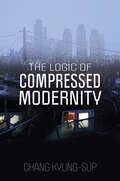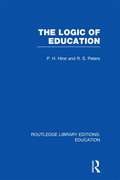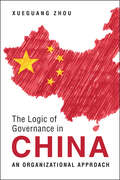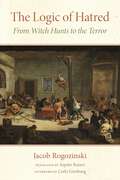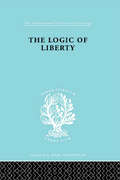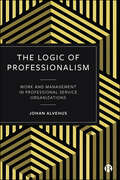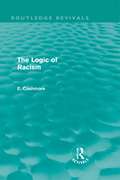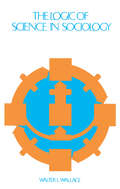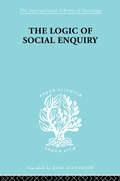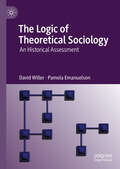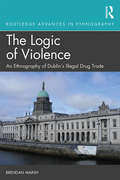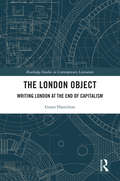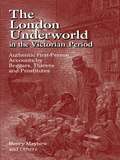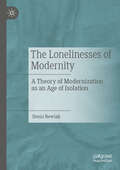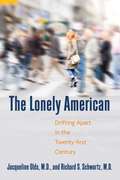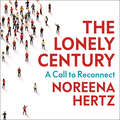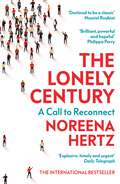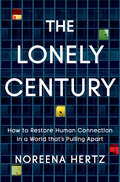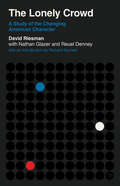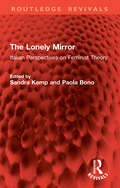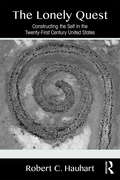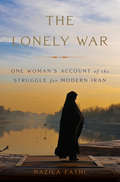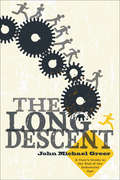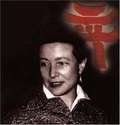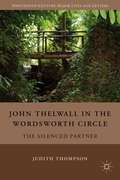- Table View
- List View
The Logic of Compressed Modernity
by Chang Kyung-SupMost theories of modernity are based, explicitly or implicitly, on the development of Western societies since the late medieval period, but these theories are of limited value for understanding the development of societies in Asia and other parts of the world, where the process of modernization took place under different circumstances and often in a rapid and highly compressed fashion – not over centuries but in decades. Asian societies have been propelled into modernity too, but theirs is a compressed modernity, which displays very different traits. In this important book, Chang Kyung-Sup provides a systematic account of this compressed modernity and uses it to analyse the extreme social changes, complexities and imbalances found in South Korea and other East Asian societies. While these changes enabled South Korea to modernize very quickly and achieve high levels of economic growth, they also created a society that is haunted by various developmental and civilizational costs, such as endemic generational conflicts, overloaded family responsibilities and exceptionally high suicide rates. As with other societies that have experienced compressed modernity, the South Korean “miracle” is replete with extreme and contradictory social traits. This pioneering work of the nature and consequences of compressed modernity will be of great interest to students and scholars of sociology, politics and development studies, as well as anyone interested in South Korea, Asia and postcolonial societies.
The Logic of Education (Routledge Library Editions: Education)
by P. H. Hirst and R. S. PetersThis book explores the implications for the curriculum, for teaching and for the authority structure of schools and colleges of an analysis of ‘education’ in which the development of knowledge and understanding is accorded a central position. The book explains what philosophy of education is, and by concentrating on its central concepts, initiates readers into exploring it for themselves. It also serves as a succinct introduction to the growing literature on philosophy of education in the UK.
The Logic of Governance in China The Logic of Governance in China: An Organizational Approach
by Xueguang ZhouDrawing on more than a decade of fieldwork, The Logic of Governance in China develops a unified theoretical framework to explain how China's centralized political system maintains governance and how this process produces recognizable policy cycles that are obstacles to bureaucratic rationalization, professionalism, and rule of law. The book is unique for the overarching framework it develops; one that sheds light on the interconnectedness among apparently disparate phenomena such as the mobilizational state, bureaucratic muddling through, collusive behaviors, variable coupling between policymaking and implementation, inverted soft budget constraints, and collective action based on unorganized interests. An exemplary combination of theory-motivated fieldwork and empirically-informed theory development, this book offers an in-depth analysis of the institutions and mechanisms in the governance of China.
The Logic of Hatred: From Witch Hunts to the Terror
by Jacob RogozinskiThis book works to uncover the logic of hatred, to understand how this affect manifests itself historically in persecution and terror apparatuses. More than a historical genealogy of persecution, The Logic of Hatred shows what phenomenology can offer to historical understanding. Focusing on the witch-hunts waged in the fifteenth through seventeenth centuries, the first part of the book analyzes the techniques instigators used to designate and annihilate their targets: the search for diabolical stigma, the confession of “truth” extracted by torture, the constitution of an absolute Enemy through the suggestion of conspiracy, of a world turned upside-down, or the figure of Satan.Rogozinski locates one of the origins of the witch-hunt in the anguish that popular uprisings arouse in dominant classes. The second part of the book extends the investigation to related phenomena, such as the extermination of lepers in the Middle Ages and the Reign of Terror during the French Revolution. By studying these historical experiences and marking their differences and similarities, this book shows the passage from exclusion to persecution and how revolts of the oppressed can let themselves be transformed and captured by persecutory politics. The analyses presented thus shed light on conspiracy theory and the terror apparatuses of our time.
The Logic of Liberty: Reflections and Rejoinders (International Library of Sociology)
by Michael PolanyiThis is Volume XI of eighteen in the Political Sociology Series and looks at the rejections and rejoinders of the logic of liberty, originally published in 1951.
The Logic of Professionalism: Work and Management in Professional Service Organizations
by Johan AlvehusThis book discusses common management and work practices in professional service organizations. Alvehus opens important discussions on what it means to work, manage, and be managed in such professional organizations, casting light on classic conflicts. He takes everyday work as a starting point and adopts a critical view that focuses on challenges and struggles in both public and private settings. He offers new perspectives and key insights for the future of professionalism. Providing a comprehensive overview of the field, this book is an important guide for understanding how professionalism is maintained in today’s organizations. It will be essential reading for students and scholars of management and leadership.
The Logic of Racism (Routledge Revivals)
by E. CashmoreFirst published in 1987, The Logic of Racism provides a portrait of race relations based on the stories of 800 different individuals from all sections of society. In this book, voices from the author’s tape recorder are converted to the page for the reader to experience the vivid, sometimes humorous and frequently disturbing impressions of race relations as they are experienced. Interviewees include people from different age groups, sexes, races, and social backgrounds as well as the politicians, teachers and professionals responsible for fighting racism. The book combines real life experiences with the author’s analysis and the result is a text that focuses on the reasoning behind prejudice and its resistance to rational argument.
The Logic of Science in Sociology
by Walter WallaceThe subject of this book is limited to the abstract form or "logic" of science, as applied particularly to scientific sociology. But the discussion presented here goes beyond abstraction and serves a practical role in the sociology and history of science by providing a framework for reducing the enormous variety of scientific researches-both within a given field and across all fields-to a limited number of interrelated formal elements. Such a framework may prove useful in assessing empirical relationships between the formal aspects of scientific work and its substantive social, economic, political, and historical aspects. This is a work of synthesis that merits close attention. It provides an area for viewing theory as something more than a review of the history of any single social science discipline.
The Logic of Social Enquiry (International Library of Sociology)
by Quentin GibsonThis comprehensive set introduces the fundamental principles of Sociology as propounded by such great figures as Gerth and Mills, Schlesinger, and Homans. Containing classic works of social theory and empirical research, volumes in this set bring together the British, European and American traditions. The whole body of sociological theory is presented in such a way that is valuable and accessible to both students and teachers of Sociology, Political Theory and Geography.
The Logic of Theoretical Sociology: An Historical Assessment
by David Willer Pamela EmanuelsonThis book takes an historical view to explain how social science arrived at its current state and proposes solutions to its problems. This book shows the reader that theory is the method of the sciences. First it explains how the empiricism of J. S. Mill and R. A. Fisher has blocked the growth of theory-driven research. The myths of how science works, as proposed by T. Kuhn, have added another layer of obfuscation. Wholesale adoption of empiricist methods has produced the replication crisis – that most experimental findings cannot be replicated in economics and psychology and undoubtedly also in sociology. Without theory, the scope of research topics has constricted, resulting in what R. Merton feared, a balkanization of knowledge in sociology. Then, having cleared the intellectual underbrush, the book turns to how theory-driven experiments are constructed. Fortunately, today a number of theory-driven experimental studies are found in the literature. This book's use of those studies as examples will help the reader understand this form of experimentation. The authors envision an explanatory sociology in which experimentally grounded theory forms a &‘toolbox&’. The parts of the toolbox are deployed to explain complex historical and contemporary events. Here examples are few and far between: we will need to build new ones. Taken together, this book envisions a radically changed social science, and it is vital reading for scholars across sociology, political science, economics, and social psychology.
The Logic of Violence: An Ethnography of Dublin's Illegal Drug Trade (Routledge Advances in Ethnography)
by Brendan MarshViolence is widely associated with illegal drug markets, and is one of the features that can differentiate illegal capitalism from legitimate business. This book explores the perceived causes and functions of violence in an illegal drug market in Dublin City, Ireland. Understanding why violence occurs amongst participants in illegal drug markets is an ongoing part of the criminological endeavour. Scholars debate the various business and personal factors that contribute towards violent perpetration. Complex aspects of participants’ lives, such as addictive disorders, socioeconomic status, and socialisation, add further complexity. This book examines violence in an illegal drug market from the perspectives of those who had participated in it, that is, formerly addicted people as well as former profit-oriented drug dealers. The text is the result of the first ethnographic study of an illegal drug market in Dublin. This book will appeal to undergraduate and postgraduate students, as well as scholars interested in the criminology and psychology of violence. More specifically, the book will be relevant to those interested in the areas of illegal drug markets, gang studies, the intersection of drugs and crime, and desistance from crime.
The London Object: Writing London at the End of Capitalism (Routledge Studies in Contemporary Literature)
by Grant HamiltonÉtienne Balibar writes that today we are at the end of capitalism. This is not because capitalism has run its course or has met an irresistible force, but because there can be no purer form of capitalism than the one we have today. Taking seriously the idea that this strain of capitalism has not only seized the urban environment but is the urban environment, works by Michael Moorcock, Iain Sinclair, Penelope Lively, Peter Ackroyd, and J.G. Ballard are read as representative of a loosely allied group of London writers who have anticipated, critiqued, and offered up various avenues of resistance to the deleterious effects of this most vigorous strain of capitalism. Writing on the city by charting a politics of reconnection to the real that necessarily unsettles the epistemological and ontological ground upon which both modernity and capitalism sit, this stable of writers makes clear the ways in which the sheer materiality of the urban environment profoundly influences the being and thinking of individuals. In so doing, these writers produce works which when read together give the coordinates of an altermodernity that might just allow capitalism to reach its final conclusion.
The London Underworld in the Victorian Period: Authentic First-Person Accounts by Beggars, Thieves and Prostitutes
by Henry MayhewThe first and possibly the greatest sociological study of poverty in 19th-century London, this survey by a journalist invented the genre of oral history a century before the term was coined. Henry Mayhew vowed "to publish the history of a people, from the lips of the people themselves — giving a literal description of their labour, their earnings, their trials and their sufferings, in their own 'unvarnished' language." With his collaborators, Mayhew explored hundreds of miles of London streets in the 1840s and 1850s, gathering thousands of pages of testimony from the city's humbler residents. Their stories revealed aspects of city life virtually unknown to literate society.A sprawling, four-volume history resulted from Mayhew's investigations. This extract focuses on the criminal class--pickpockets, prostitutes, rag pickers, and vagrants, whose true stories of degradation, horror, and desperation rival Dickensian fiction. A classic reference source for sociologists, historians, and criminologists, Mayhew's work is immensely readable. As Thackeray wrote, these urban vignettes conjure up "a picture of human life so wonderful, so awful, so piteous and pathetic, so exciting and terrible, that readers of romances own they never read anything like to it."
The Lonelinesses of Modernity: A Theory of Modernization as an Age of Isolation
by Denis NewiakModernity presents itself as an age of increasing social disintegration: secularization and rationalization, urbanization and globalization, individualization and digitalization make it difficult for communities today. Modernity comes with desirable promises that make it attractive, but it does not come free: Its price is escalating modern loneliness. Denis Newiak tells a cultural history of modernization that, from industrialization to the late-modern network society, produces ever new and harsher experiences of loneliness.
The Lonely American: Drifting Apart in the Twenty-first Century
by Jacqueline Olds Richard S. SchwartzThe personal and societal effects of the unheralded epidemic of social isolation in America In today's world, it is more acceptable to be depressed than to be lonely--yet loneliness appears to be the inevitable byproduct of our frenetic contemporary lifestyle. According to the 2004 General Social Survey, one out of four Americans talked to no one about something of importance to them during the last six months. Another remarkable fact emerged from the 2000 U.S. Census: more people are living alone today than at any point in the country's history--fully 25 percent of households consist of one person only. In this crucial look at one of America's few remaining taboo subjects--loneliness--Drs. Jacqueline Olds and Richard S. Schwartz set out to understand the cultural imperatives, psychological dynamics, and physical mechanisms underlying social isolation In The Lonely American, cutting-edge research on the physiological and cognitive effects of social exclusion and emerging work in the neurobiology of attachment uncover startling, sobering ripple effects of loneliness in areas as varied as physical health, children's emotional problems, substance abuse, and even global warming. Surprising new studies tell a grim truth about social isolation: being disconnected diminishes happiness, health, and longevity; increases aggression; and correlates with increasing rates of violent crime. Loneliness doesn't apply simply to single people, either-today's busy parents "cocoon" themselves by devoting most of their non-work hours to children, leaving little time for friends, and other forms of social contact, and unhealthily relying on the marriage to fulfill all social needs As a core population of socially isolated individuals and families continues to balloon in size, it is more important than ever to understand the effects of a culture that idealizes busyness and self-reliance. It's time to bring loneliness--a very real and little-discussed social epidemic with frightening consequences--out into the open, and find a way to navigate the tension between freedom and connection in our lives.
The Lonely Century: A Call to Reconnect
by Noreena Hertz'Indispensable, engaging and brilliant book about the pervasiveness of loneliness in the twenty-first century and its far-reaching impact...a hopeful book that couldn't be more important or timely.' Philippa Perry, author of The Book You Wish Your Parents Had ReadEven before a global pandemic introduced us to terms like social distancing, loneliness was already becoming the defining condition of the twenty-first century.'Fascinating, timely and important...Read it, then pass it on to a friend. If you can find one.' Charlie BrookerCarl, the Los Angeles media executive so lonely he pays to be cuddled. Eric, the Parisian baker finding community in the political far right. Peter, the London schoolboy distraught because no one 'likes' his Instagram posts.All around us, the fabric of community is unravelling and our personal relationships are under threat. And technology isn't the sole culprit; equally to blame are the dismantling of civic institutions, the radical reorganisation of the workplace, mass migration to cities, and decades of neoliberal policies that placed self-interest above the collective good.'Passionately argued and deeply researched, this book is for everyone who wants to build a healthier and more connected world.' Arianna HuffingtonThis is not merely a mental health crisis. Loneliness increases our risk of heart disease, cancer and dementia. Statistically, it's as bad for our health as smoking fifteen cigarettes a day. It's also an economic crisis, costing us billions annually, and a political crisis, with feelings of marginalisation fuelling divisiveness and extremism around the world.But it's also one we have the power to reverse. Combining a decade of research with first-hand reporting, Noreena Hertz takes us from a 'how to communicate in real life' class at an Ivy League university to encounters in German beer gardens between people with radically different political views, from 'renting a friend' in Manhattan to nursing home residents knitting bonnets for their robot caregivers in Japan.Offering bold solutions ranging from compassionate AI to innovative models for urban living to new ways of reinvigorating our neighbourhoods and reconciling our differences, The Lonely Century offers a hopeful and empowering vision for how to heal our fractured communities and restore connection in our lives.(P) 2020 Hodder & Stoughton Ltd
The Lonely Century: A Call to Reconnect
by Noreena Hertz'If I could issue a reading list to 10 Downing Street, I'd put this book near the top.' Guardian 'Destined to be a classic' Nouriel Roubini'Fascinating' Sathnam Sanghera, The Times'A hopeful book that couldn't be more important or timely' Philippa Perry 'Timely and important' Charlie BrookerA hopeful and empowering vision for how to reconnect with each other and heal our divides.Even before a global pandemic introduced us to terms like social distancing, loneliness was already becoming the defining condition of the twenty-first century. But it's also one we have the power to reverse. Combining a decade of research with first-hand reporting, Noreena Hertz takes us from a 'how to communicate in real life' class for smartphone-addicted university students to bouncy castles at Belgian far-right gatherings, from 'renting a friend' and paying for cuddles in the U.S. to nursing home residents knitting bonnets for their robot caregivers in Japan.Packed with bold solutions that we can apply at home, at work and in our neighbourhoods, and with a clear vision for what businesses and governments must do, she explores how our increasing dependence on technology, radical changes to the workplace and decades of policies that have placed self-interest above the collective good, are making us more isolated than ever before.Noreena Hertz helps us to understand why this is the lonely century, how we got here and what each of us can do to help reduce loneliness for ourselves and our communities.
The Lonely Century: How to Restore Human Connection in a World That's Pulling Apart
by Noreena HertzA bold, hopeful, and thought-provoking account by &“one of the world&’s leading thinkers&” (The Observer) of how we built a lonely world, how the pandemic accelerated the problem, and what we must do to come together again &“A compelling vision for how we can bridge our many divides at this time of great change and disruption.&”—Arianna Huffington, founder and CEO of Thrive Global NAMED ONE OF THE BEST BOOKS OF THE YEAR BY WIRED (UK) AND THE DAILY TELEGRAPHLoneliness has become the defining condition of the twenty-first century. It is damaging our health, our wealth, and our happiness and even threatening our democracy. Never has it been more pervasive or more widespread, but never has there been more that we can do about it. Even before a global pandemic introduced us to terms like &“social distancing,&” the fabric of community was unraveling and our personal relationships were under threat. And technology isn&’t the sole culprit. Equally to blame are the dismantling of civic institutions, the radical reorganization of the workplace, the mass migration to cities, and decades of neoliberal policies that have placed self-interest above the collective good.This is not merely a mental health crisis. Loneliness increases our risk of heart disease, cancer, and dementia. Statistically, it&’s as bad for our health as smoking fifteen cigarettes a day. It&’s also an economic crisis, costing us billions annually. And it&’s a political crisis, as feelings of marginalization fuel divisiveness and extremism around the world. But it&’s also a crisis we have the power to solve.Combining a decade of research with firsthand reporting, Noreena Hertz takes us from a &“how to read a face&” class at an Ivy League university to isolated remote workers in London during lockdown, from &“renting a friend&” in Manhattan to nursing home residents knitting bonnets for their robot caregivers in Japan.Offering bold solutions ranging from compassionate AI to innovative models for urban living to new ways of reinvigorating our neighborhoods and reconciling our differences, The Lonely Century offers a hopeful and empowering vision for how to heal our fractured communities and restore connection in our lives.
The Lonely Crowd: A Study of the Changing American Character (Veritas Paperbacks)
by Nathan Glazer David Riesman Reuel Denney&“One of the most important books of the twentieth century.&”—Gideon Lewis-Kraus, New Yorker Considered by many to be one of the most influential books of the twentieth century, The Lonely Crowd opened exciting new dimensions in our understanding of the problems confronting the individual in twentieth-century America. Richard Sennett&’s new introduction illuminates the ways in which Riesman&’s analysis of a middle class obsessed with how others lived still resonates in the age of social media. &“Indispensable reading for anyone who wishes to understand American society. After half a century, this book has lost none of its capacity to make sense of how we live.&”—Todd Gitlin
The Lonely Mirror: Italian Perspectives on Feminist Theory (Routledge Revivals)
by Sandra Kemp Paola BonoContributing to a lively dialogue with Anglo-American and French theorists, The Lonely Mirror (originally published in 1993) sets out to contextualize Italian feminist theory within the international debate. The essays vividly illuminate the specific character of Italian feminism as a political and intellectual movement and expose the differences between the more institutionalized nature of women’s studies in the United States and Britain. It will be of vital interest both to general and academic readers who want to explore some of the most vibrant developments in European feminism.
The Lonely Quest: Constructing the Self in the Twenty-First Century United States
by Robert C. HauhartToday the United States is a country divided along lines of gender, economic inequality, educational level, and political affiliation. Democrats typically select a different range of matters of serious public concern compared to Republicans. Many Americans describe difficulty in coming to terms with the demands placed on them in their work, communities, and personal lives and achieving satisfaction. The institutional crises that pervade our politics, economy, educational systems, and communities have inspired a contemporary crisis: a widespread inability for many to live as integrated, effective selves in the twenty-first century United States. Drawing on a wide range of historical and contemporary research, The Lonely Quest explores the dilemma of constructing the self in the U.S. today.
The Lonely War: One Woman's Account of the Struggle for Modern Iran
by Nazila FathiAs a nine-year-old Tehrani schoolgirl during the Iranian Revolution, Nazila Fathi watched her country change before her eyes. The revolutionaries--most of them poor, uneducated, and radicalized--seized jobs, housing, and positions of power, transforming Iranian society practically overnight. But this socioeconomic revolution had an unintended effect. As Fathi shows, the forces unleashed in 1979 inadvertently created a robust Iranian middle class, one that today hungers for more personal freedoms and a renewed relationship with the outside world. And unless an international confrontation allows Iranian leaders to justify an internal crackdown, this internal pressure for reform will soon set the country on a more stable track. In The Lonely War, Fathi describes Iran’s awakening alongside her own, revealing how moderates are retaking the country--and how foreign powers can aid their progress.
The Long Descent: A User's Guide to the End of the Industrial Age
by John Michael GreerThe author of Dark Age America shares a harrowing vision of the future and what you can do to take action and make change.Americans are expressing deep concern about US dependence on petroleum, rising energy prices and the threat of climate change. Unlike the energy crisis of the 1970s, however, there is a lurking fear that, now, the times are different, and the crisis may not easily be resolved.The Long Descent examines the basis of such fear through three core themes:Industrial society is following the same well-worn path that has led other civilizations into decline, a path involving a much slower and more complex transformation than the sudden catastrophes imagined by so many social critics today.The roots of the crisis lie in the cultural stories that shape the way we understand the world. Since problems cannot be solved with the same thinking that created them, these ways of thinking need to be replaced with others better suited to the needs of our time.It is too late for massive programs for top-down change; the change must come from individuals.Hope exists in actions that range from taking up a handicraft or adopting an “obsolete” technology, through planting an organic vegetable garden, taking charge of your own health care or spirituality, and building community.Focusing eloquently on constructive adaptation to massive change, this book will have wide appeal.Praise for The Long Descent“At once erudite and entertaining, Greer’s exploration of the dynamics of societal collapse couldn’t be more timely.” —Richard Heinberg, Senior Fellow, Post Carbon Institute, and author of The Party’s Over and Peak Everything“Candidates for public office, and the voters who elect them, should be required to read [Greer’s] accurate diagnosis of the terminal illness our fossil-energy subsidized industrial civilization has too long denied. He shows how stubborn belief in perpetual progress blinded us to the abyss toward which we were speeding and thus impeded wise preparation for our unavoidable descent into a deindustrial age. We must hope that the array of mitigating tools he prescribes may yet render that descent down the back side of Hubbert’s peak less devastating than it will be if we insistently claim a right to be prodigal in using this finite Earth.” —Willam R. Catton, Jr., author of Overshoot: The Ecological Basis of Revolutionary Change
The Long March: An Account of Modern China
by Simone De Beauvoir Austryn WainhouseAuthor of "The Second Sex", and one of the 20th century's most brilliant writers, Simone de Beauvoir turns her attention eastward to China and paints a masterly picture of that nation in modern times. Honest and detailed, it comes from de Beauvoir's personal journey through the country: "I have tried to evaluate all the knowledge gained at first-hand, by actually seeing places and talking with people", she said, poignantly, noting how the Chinese "are fighting hard to build a human world".
The Long Shadow of the British Empire: The Ongoing Legacies Of Race And Class In Zambia
by Juliette Bridgette Milner-ThorntonThis book explores the lived experiences of formerly colonized people in the privacy of their homes, communities, workplaces, and classrooms, and the associations created from these social interactions. It examines the centrality of gender and social identity in the formation of non-western people in the British Empire.
